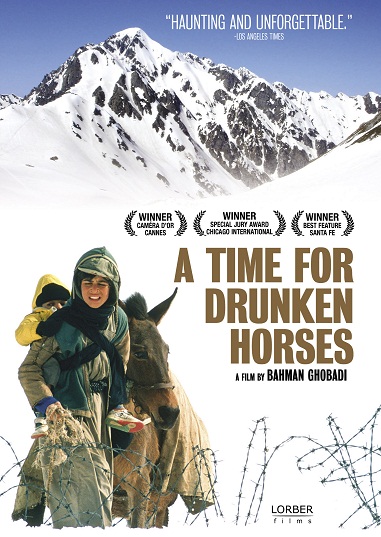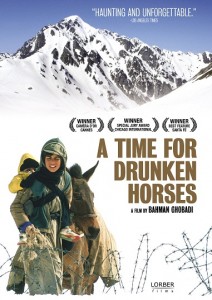This Tuesday, citizen journalism collective Mosireen, presented the Iranian film A Time for Drunken Horses (2000), by Kurdish-Iranian filmmaker Bahman Ghobadi. Using a cast of untrained child actors, Ghobadi presents a child’s eye view of the precarious, sometimes terrifying, existence of Kurdish villagers living on the Iran-Iraq border.
The film opens over the border in Iraq and shows Ayoub and his younger sister dodging between the towering figures of shoppers in a market, carrying out bit jobs to earn some extra money to take back to their father. Returning to Iran that night, they discover their father has been killed attempting to smuggle goods over the border. The now-orphaned Ayoub must leave school to support his siblings. Adding to the burden on the small family of children, they are in need of money for an operation for their disabled younger brother, Madi.
Set against the unforgiving backdrop of the wind and snow-wracked mountain ranges between Iran and Iraq, A Time for Drunken Horses presents the story of the children struggling to survive alone against seemingly insurmountable hardship; epitomised in the film by Ayoub’s repeated failed attempts to help his family by crossing the mountains into Iraq.
Ayoub tries first to help his brother by taking a job carrying loads over the mountain border in the extreme cold. The job is so difficult that even the mules and horses are fed alcohol in order to endure the journey. “This is not a job for children” he is told by a smuggler, “there are landmines and ambushes all along the way”.
Exhausting himself, staggering and straining to keep up with the other men, Ayoub is finally cheated out of the money he is owed for carrying the load. A small boy running the tea shop on the Iraqi side of the border shakes his head at Ayoub’s naivety, “you must be new at this”, he says, “you can’t trust anyone.”
Returning home to find his siblings struggling to survive, Ayoub must then watch his sister be married off over the mountain in order to get enough money for Madi’s operation. This attempt to cure his brother is yet again foiled when his sister’s new mother-in-law refuses to take care of the disabled boy.
Although you may expect a film with such a tragic story to risk presenting the children as superficially noble or saccharine, this is far from the case. The quiet pace of the film and stark, minimalist cinematography express a deep, bitter and impassive pain, captured with compassion.
Madi screams and sobs through a round of endless injections and treatments. The younger sister prays softly by her father’s grave surrounded by howling wind and an empty graveyard. Ayoub cries bitterly seeing his sister leave, as yet again another violent twist of fate wrenches events out of his control.
Finally, Ayoub decides to sell his mule to a buyer across the border in order to pay for his brother’s operation. When his party is ambushed, his horse falls into the snow, too drunk to walk. Ayoub and his younger brother are lost in the colossal mountain landscape, which dwarfs them, and their cries for help.
Moving, beautiful, and gripping, A Time for Drunken Horses confronts you with an unflinching view of children enduring immense difficulty and hardship. The abandonment of the children and their feelings of powerlessness, subtly reflect the wider reality of life in a community which has been long-neglected in the region.



